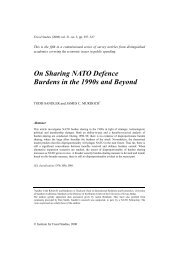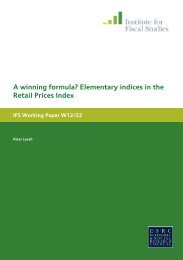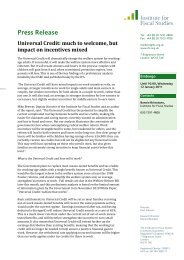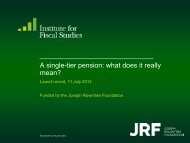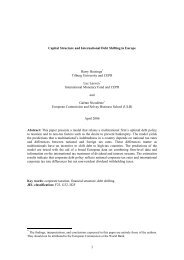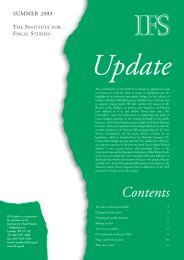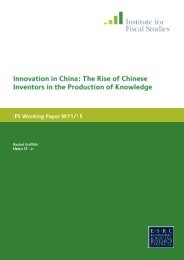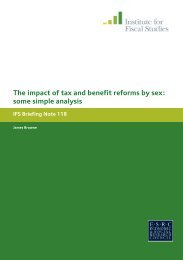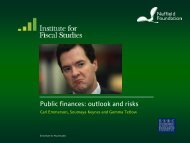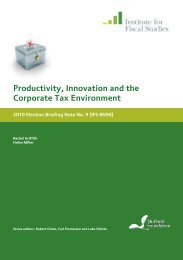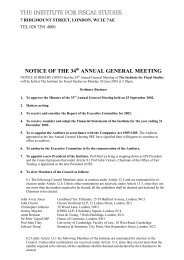A single-tier pension: what does it really mean? - The Institute For ...
A single-tier pension: what does it really mean? - The Institute For ...
A single-tier pension: what does it really mean? - The Institute For ...
You also want an ePaper? Increase the reach of your titles
YUMPU automatically turns print PDFs into web optimized ePapers that Google loves.
7. Conclusions<br />
Pensions Bill 2013–14 proposed a significant reform of state <strong>pension</strong> rules in the<br />
UK – bringing about a system under which the same state <strong>pension</strong> income will be<br />
accrued for a wide range of activ<strong>it</strong>ies during working life. This reform marks<br />
perhaps the final step on a journey to unpick the effects of the 1975 introduction<br />
of SERPS. Indeed, the proposed system will look rather similar to the state<br />
<strong>pension</strong> system that was in place in 1974, although w<strong>it</strong>h more extensive cred<strong>it</strong>ing<br />
for periods of unpaid activ<strong>it</strong>y. <strong>The</strong> short- and long-run effects of the proposed<br />
reforms are very different.<br />
<strong>The</strong> short-run effect of this policy is to equalise <strong>pension</strong> incomes for those close<br />
to retirement more quickly than would be achieved under current legislation.<br />
Few people living in the UK will see any significant reduction in their already<br />
accrued rights but some will see significant increases. In particular, this applies to<br />
those who had significant periods out of paid work caring for children prior to<br />
2002 and to the long-term self-employed. Using a unique new data set that links<br />
individuals’ National Insurance contribution histories to detailed survey data on<br />
their socio-demographic, financial and health circumstances, we have been able<br />
to analyse in detail how the proposed reforms will affect the state <strong>pension</strong><br />
ent<strong>it</strong>lements and <strong>mean</strong>s-tested benef<strong>it</strong> ent<strong>it</strong>lements of those reaching state<br />
<strong>pension</strong> age (SPA) between April 2016 and March 2020.<br />
Our analysis suggests that 27% of those reaching SPA between April 2016 and<br />
March 2020 (34% of men and 11% of women) would anyway accrue state<br />
<strong>pension</strong> rights worth more than the level of the <strong>single</strong>-<strong>tier</strong> <strong>pension</strong>. This group<br />
will be largely unaffected by the proposed reforms.<br />
In these short-run cohorts, 19% of individuals (21% of men and 14% of women)<br />
stand to receive a lower state <strong>pension</strong> at SPA under the proposed system than<br />
under the current system. At the same time, 43% of individuals (35% of men and<br />
61% of women) will see an increase in state <strong>pension</strong> income; 26% of individuals<br />
would see an increase of at least £5 per week in their state <strong>pension</strong> income and<br />
13% would see an increase of at least £10 per week.<br />
Those who are likely to see the largest increases in their state <strong>pension</strong> income are<br />
women, people w<strong>it</strong>h relatively low wealth and those who have been selfemployed.<br />
On average, individuals in these cohorts living in England are set to<br />
gain £2.74 per week in state <strong>pension</strong> income at SPA. This figure is £5.23 for<br />
women, compared w<strong>it</strong>h £1.62 for men. We estimate that those who have had at<br />
least 10 years in self-employment will gain on average £7.51, compared w<strong>it</strong>h<br />
£2.19 among those who have never been self-employed. Those in the richest<br />
wealth quintile will gain £2.18 per week on average, compared w<strong>it</strong>h £3.97 per<br />
week among the lowest wealth quintile.<br />
Some of these increases in state <strong>pension</strong> income will be offset by the loss of<br />
<strong>mean</strong>s-tested benef<strong>it</strong>s and, for some groups, the abol<strong>it</strong>ion of savings cred<strong>it</strong><br />
alongside the introduction of the <strong>single</strong>-<strong>tier</strong> <strong>pension</strong> will actually lead to an<br />
68<br />
© Inst<strong>it</strong>ute for Fiscal Studies



